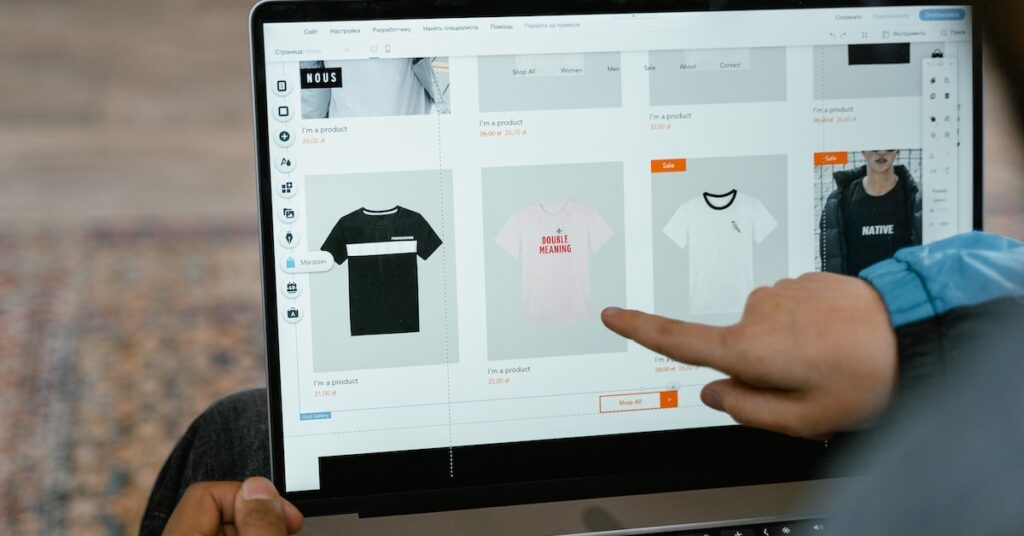- Get $10,000 in your DEMO account
- Minimum trading amount is $1
- Get up to 98% Rate on Return
- Fast deposits and withdrawals
- $10 minimum deposit
- $10 minimum withdrawal
Last updated on June 13th, 2023 at 09:50 am
Are you ready to take the plunge and start your own online business in Kenya?
Look no further! The world of e-commerce is booming and there has never been a better time to be an entrepreneur.
Kenya is a fast-growing economy with a vibrant digital landscape, making it the perfect place to launch your online store.
But where do you start?
- Get $10,000 in your DEMO account
- Minimum trading amount is $1
- Get up to 98% Rate on Return
- Fast deposits and withdrawals
- $10 minimum deposit
- $10 minimum withdrawal
Don’t worry, we’ve got you covered.
In this article, we’ll guide you through the basics of starting your own online business in Kenya.
From defining your niche to setting up your website and marketing your brand, we’ll give you expert tips and advice to help you take your first steps towards success.
So grab a cup of coffee, sit back and get ready to turn your dreams into reality!
What’s an online business?
An online business refers to any type of business that primarily operates through the internet.
This means that most, if not all, of the activities and transactions of an online business are conducted virtually.
And they can be selling either services or physical products.
In fact, online businesses in Kenya can also offer digital products like e-books and courses.
That said, there are various types of online businesses in Kenya ranging from e-commerce stores like Jumia and Kilimall to service-based businesses such as freelance writing or virtual assistance.
Other examples of popular online businesses in Kenya include social media management companies, affiliate marketing websites, dropshipping stores and graphic design services among others.
- Get $10,000 in your DEMO account
- Minimum trading amount is $1
- Get up to 98% Rate on Return
- Fast deposits and withdrawals
- $10 minimum deposit
- $10 minimum withdrawal
One advantage of running an online business in Kenya is that it allows entrepreneurs to reach a wider audience beyond their geographical location.
For instance, someone in Nairobi can sell products or services to customers in Mombasa without a physical presence.
Also, starting an online business in Kenya requires relatively low capital compared to traditional brick-and-mortar businesses.
Let’s discuss each of that in-depth below.
Why start an online business in Kenya?
Of course, starting an online business in Kenya can be a profitable venture due to several factors.
First, the country has a rapidly growing internet penetration rate, which currently stands at over 43%.
This means that there is a large potential market for online businesses to tap into.
Additionally, with the increased usage of mobile money services such as M-PESA, it has become easier and more convenient for Kenyans to make online transactions.
Furthermore, the Kenyan government has been actively promoting entrepreneurship through initiatives such as the Youth Enterprise Development Fund and the Women Enterprise Fund.
These programs provide funding and training opportunities for young entrepreneurs and women who want to start or grow their own businesses.
- Get $10,000 in your DEMO account
- Minimum trading amount is $1
- Get up to 98% Rate on Return
- Fast deposits and withdrawals
- $10 minimum deposit
- $10 minimum withdrawal
The government has also improved infrastructure such as electricity and internet connectivity in recent years, making it easier for online businesses to operate efficiently.
To say the least, starting an online business in Kenya presents numerous opportunities for entrepreneurs looking to tap into a growing market with supportive government policies and improving infrastructure.
Success is achievable in this dynamic industry as long as one conducts thorough market research and provides quality products or services.
A brief overview of the steps to starting an online business in Kenya
Just to give you a quick taste, here are the realistic steps to start an online business in Kenya:
- Identify your niche: Before starting an online business in Kenya, it is important to identify your niche market. This involves researching and analyzing the needs of the target audience, competition, and market trends.
- Develop a business plan: A solid business plan will help you outline your objectives, strategies, financial projections, and marketing tactics. It also helps you secure funding from potential investors or financial institutions.
- Choose a domain name and web hosting: Your website is the backbone of your online business; hence, choosing a domain name that reflects your brand identity and resonates with your target audience is important.
- Build a website: Once you have selected a domain name and web hosting provider, it’s time to build your website using content management systems such as WordPress or Wix.
- Set up payment gateways: To receive payments for products or services offered on your site, set up payment gateways such as PayPal or M-Pesa.
- Create content strategy: Developing quality content for blogs, social media platforms and newsletters can attract new customers while retaining existing ones
- Marketing strategy: After creating a comprehensive content strategy develop an effective marketing plan which includes social media advertising campaigns Google Ads among others
- Launching the site: After completing all the above steps launch the site officially
- Collect customer feedback- Collect feedback from customers either through surveys or other forms of communication
Let’s discuss each of these steps on how to start an online business in Kenya.
Step 1: Identify Your Niche/Market

Identifying your niche market is the first and most crucial step in starting an online business in Kenya.
Your business idea niche market refers to the specific group of people who have a common problem or need that you can solve through your products or services.
Before launching your business, it’s essential to research and identify which niche markets are underserved in Kenya.
To identify a profitable niche, follow these steps:
Decide What Kind of Products/Services You Will Sell
Once you have decided to start an online business in Kenya, the next step is to determine what kind of products or services you will sell.
Many different types of businesses can be started online, but choosing a niche that interests you and has demand is important.
One approach is to look at your own skills and interests and see if there’s a market for them.
For example, if you’re passionate about photography, you could start an online business selling your prints or offering photography services.
Alternatively, you could research popular niches and identify gaps in the market where there’s room for a new player.
It’s also important to consider the logistics of selling your product or service online.
- Get $10,000 in your DEMO account
- Minimum trading amount is $1
- Get up to 98% Rate on Return
- Fast deposits and withdrawals
- $10 minimum deposit
- $10 minimum withdrawal
Will it require shipping?
Will customers need to download something?
These factors can impact both costs and customer experience, so it’s important to plan ahead before launching your business.
Identify a gap in the market
Now that you have an idea of what niche/market you’d wish to serve, the next thing you need to do is to identify a gap in the market.
It is a crucial for any entrepreneur looking to start an online business in Kenya.
To do this, first, do thorough research on the current state of the online market and identify areas that are underserved or not yet tapped into.
This could involve analyzing existing businesses and their offerings, studying consumer behavior, and conducting surveys and focus groups.
Once a potential gap has been identified, validate it by testing out your idea with a minimum viable product or prototype.
This will help you gauge consumer interest and demand before investing significant time and resources into developing a full product or service.
Finally, once you’ve validated your concept, build a strong brand presence around your business in order to stand out from competitors.
This could involve creating compelling content across various social media platforms, optimizing your website for search engines, and engaging with customers through personalized messaging and customer service.
But we are getting ahead of ourselves.
Let’s see the next step to start an online business in Kenya.
Research your target audience
To start an online business in Kenya, first research your target audience.
This will help you determine exactly who you are catering to and what their needs and desires are.
One way to do this is through social media analytics.
By analyzing your social media followers, you can learn about their demographics, interests, and behavior patterns.
This works if you already have a social media audience.
But if you don’t, another way to research your target audience is by conducting surveys or focus groups.
This allows you to gather direct feedback from potential customers on what they want from a product or service like yours.
Another best way is researching competitors within your market.
This can provide valuable insights into what has worked for them and what hasn’t.
See, by taking the time to understand your target audience before launching your online business in Kenya, you can ensure that you are providing a product or service that meets their needs and stands out in the crowded digital marketplace.
Determine your unique selling proposition
Now that you know who will buy from you, to successfully start an online business in Kenya, determine your unique selling proposition (USP).
Your USP is what sets you apart from your competitors and helps you stand out in the market.
To identify your USP, start by researching your target audience and understanding their needs and preferences (which you did earlier).
So, once you clearly understand your target audience, evaluate the competition and identify what they are offering.
This will help you differentiate yourself by offering something unique that meets the needs of your target audience.
Your USP should be differentiating, relevant, and compelling enough to persuade customers to choose you over others.
To get your creative juice flowing, here are some examples of USPs for online businesses in Kenya:
- Fast and Reliable Nationwide Delivery: Offering a USP of fast and reliable nationwide delivery for online businesses in Kenya can be a significant competitive advantage. This could involve partnering with reputable logistics companies to ensure timely delivery of products to customers across the country, with reliable tracking and customer support.
- Authentic Kenyan Products: Highlighting that the online business exclusively offers authentic Kenyan products can be a strong USP. This could involve partnering with local artisans, farmers, or manufacturers to source unique Kenyan products that are not readily available elsewhere, thereby appealing to customers who value local culture and craftsmanship.
- Easy Payment Options: Offering convenient and diverse payment options could be a USP for online businesses in Kenya. This could include mobile money platforms, such as M-Pesa, which are popular and widely used in Kenya, along with other online payment methods, such as credit/debit cards or cash on delivery, to accommodate different customer preferences.
- Personalized Customer Service: Providing personalized customer service can be a USP for online businesses in Kenya. This could involve offering live chat support, personalized product recommendations, or customized offers based on customer preferences and browsing behavior, to create a personalized and engaging shopping experience.
- Exclusive Deals and Promotions: Offering exclusive deals, promotions, or loyalty programs can be a USP for online businesses in Kenya. This could involve providing special discounts, early access to new products, or loyalty rewards to incentivize repeat purchases and foster customer loyalty.
- Hassle-Free Returns and Exchanges: Providing hassle-free returns and exchanges can be a USP for online businesses in Kenya. This could involve offering easy return processes, free return shipping, or no-hassle exchanges to instill confidence in customers and encourage them to shop online with peace of mind.
- Customization and Personalization Options: Offering customization or personalization options for products can be a USP for online businesses in Kenya. This could involve allowing customers to customize products, such as clothing, accessories, or home decor, with their preferred colors, sizes, or designs, to create a unique and personalized shopping experience.
- Virtual Try-On or Augmented Reality (AR) Shopping: Providing virtual try-on or AR shopping experiences for products like clothing, eyewear, or beauty products can be a USP for online businesses in Kenya. This can allow customers to virtually try on products and see how they look before making a purchase, enhancing the online shopping experience and reducing returns.
Remember that a good USP should be easy to communicate, memorable, and authentic.
It should accurately reflect your brand identity and what makes your online business special.
Resource:
- 31 Profitable Online Businesses in Kenya (57K PERMONTH)
- Earn Money Online for Free: 14 Legit Business Ideas in Kenya
Step 2: Register Your Online Business

The next step to start a successful online business in Kenya is registering your business.
Do I need to register my online business in Kenya?
Yes, you do need to register to sell online in Kenya. It’s a legal requirement for all businesses operating within the country and offers several benefits.
Let’s look at what you need to register an online business in Kenya.
First, search, reserve, and register a business name.
To register a business name in Kenya, you need to meet the following requirements:
- Conduct a name search through the Registrar of Companies and wait for approval of the proposed identity
- Describe the nature and activities of the proposed entity
- Provide the full identities of all the proprietors Indicate the postal address for the proposed name
- Indicate the physical address of the proposed entity- include the plot number, the town and the county
- Presentation of copies of the national IDs or Passports of all partners or proprietors
- Present passport photos of the partners as well as copies of their PIN Certificate
- Payment of Ksh. 850 for company registration (Ksh. 800 for registration and Ksh. 50 as convenience fee)
What you need to register an online business in Kenya
Now that you have reserved the business name, as you wait for its approval, you can prepare the following documents in preparation of business registration:
- A statement of capital.
- Memorandum and article of association.
- Shareholders Details( These include copies of National Identify card/ Kenyan Passport, KRA PIN certificates, colored passport size pictures). It is advisable that you have these documents in soft copy, which you will be required to upload.
- Company Registration fee of Ksh.10, 650.00.
- Physical Addresses of all the directors.
- A completed registration form called CR1, which you have to download on the eCitizen portal.
Once your business has been approved, the next step is to continue with the registration process.
All you have to do is upload the above documents.
And that’s it!
Obtain necessary licenses and permits
Besides registration, to start an online business in Kenya, obtain the necessary licenses and permits to operate legally.
This process can vary depending on the nature of your business and its location.
You should research the specific requirements for your industry and location before beginning the application process.
Some common licenses and permits required for online businesses in Kenya include;
- Business permit or license from the City Council
- Single business permit
- Tax compliance certificate
These are typically obtained from government agencies such as the County Council or Kenya Revenue Authority (KRA).
Additionally, if you plan to sell goods or services online, you may need to register for Value Added Tax (VAT) with KRA.
Obtaining these licenses and permits may require filling out forms, providing documentation such as identification documents or proof of ownership of property used for your business operations, and paying applicable fees.
Step 3: Create Your Website

The next step to start an online business in Kenya is to build the platform.
There are two ways you can do this:
- Use an existing platform like Shopify, OLITT, or BigCommerce to run your online business in Kenya. This costs more and you don’t control
- Build a platform you fully own.
Let me show you how to do that last one?.
Choose a domain name and web hosting service
A domain name serves as your website’s address on the internet, while web hosting refers to the storage space where your website’s files will be stored.
So, pick a domain name that is easy to remember and relevant to your business.
This makes it easier for potential customers to find you online.
Here are some examples of good and bad domain names for an online business that sells handmade soaps:
Good Domain Name:
- BlissfulSoaps.com – This domain name is short, easy to remember, and reflects handmade soaps’ positive and luxurious nature. It also includes a relevant keyword “soaps” which can help with search engine optimization (SEO).
Bad Domain Name:
- SoapSeller2021.com – This domain name is generic, lacks creativity, and includes numbers, which can make it harder to remember. It also doesn’t convey any unique selling proposition and doesn’t provide any indication of the type of products being sold.
- CheapSoapEmporium.com – This domain name may imply low quality or discounted products, which may not be desirable for a business aiming to position itself as selling high-quality handmade soaps. It also includes a long and complex name, which can be difficult for users to type and remember.
Next, you need hosting.
This is where your business files like articles, product images, etc will live online.
When selecting a web hosting service, consider factors such as uptime reliability, speed, and security features.
Uptime refers to the amount of time your website is accessible online without interruption or downtime.
Ensure that your chosen web host offers reliable uptime guarantees and has robust security measures in place to protect against cyber threats.
Comparing pricing plans from different web host providers is crucial before settling on one that fits your budget.
Some common options for web hosts include shared hosting, dedicated servers, virtual private servers (VPS), and cloud hosting.
Here are some of the best web hosting companies in Kenya according to:
- Sasahost Limited
- Truehost
- Hostpinnacle
- Kenya Web Experts
Consider which option best suits your online business needs before making any decisions since it can have long-term effects on the success of your venture.
Design your website or hire a web developer
Once you have a domain and hosting, the next step to start an online business in Kenya is to build your website.
If you have the technical know-how, designing your website can be a cost-effective and creative option.
Creating your website means you have full control over your site’s design, layout, and content.
You can also make changes to the site whenever you want without having to pay someone else to do it for you.
- Ask your hosting provider to install WordPress on your domain
- Next, install Woocommerce to start an online business in Kenya. It is a free plugin you can use to start a business like Jumia, Kilimall, or any other online shop in Kenya!
- Add necessary pages and upload product pictures
I know am making it sound easy.
However, designing a website in Kenya requires some level of technical knowledge and skills, which may take time to master.
On the other hand, hiring a web developer takes away the burden of building a website from scratch.
Web developers have web design experience and can create bespoke designs tailored to your brand’s needs.
They will handle all aspects of developing your site from creating an online store if necessary to ensuring that it is SEO optimized.
In the end, choosing whether to design your website or hire a web developer depends on various factors such as budget constraints, technical skills or preferences for customization.
Understand what each option entails so that you make an informed decision when starting an online business in Kenya.
Step 4: Develop/Source Your Product/Service

With the storefront website up and running, it is time to act on the insights you mined in step #1 on how to start an online business in Kenya.
Develop a pricing strategy
Your pricing strategy should be informed by various factors such as your target audience, competition, and cost of production.
Start by researching what your competitors charge for similar products or services to ensure you’re not undercharging or overcharging.
Consider the value your product or service delivers to customers and how much they are willing to pay.
Conduct market research to gauge customer preferences and willingness to pay. You can also offer discounts during the initial stages of operation to attract more customers.
Lastly, make sure that you consider all costs associated with running your online business such as website hosting fees, marketing costs, shipping fees (if applicable), and taxes when setting prices.
Here are some pricing model examples you can adopt:
- Flat-rate pricing: This model offers a fixed price for a product or service, regardless of usage or consumption. It’s simple and easy to understand, but may not be suitable for businesses with varying levels of usage or consumption.
- Tiered pricing: This model offers multiple pricing tiers based on different levels of features, usage, or customer segments. It allows businesses to cater to different customer segments and monetize based on usage or value delivered.
- Subscription pricing: This model offers customers access to products or services for a recurring fee. It provides predictable revenue and encourages customer loyalty, as long as the value delivered justifies the recurring cost.
- Freemium pricing: This model offers a basic version of a product or service for free, with premium features or functionality available at a premium price. It attracts a large user base with the free version and monetizes through premium upgrades.
- Pay-as-you-go pricing: This model charges customers based on their actual usage or consumption of a product or service. It’s popular for products or services with variable usage patterns and provides flexibility to customers while aligning revenue with usage.
- Bundled pricing: This model offers multiple products or services bundled together at a discounted price compared to buying them separately. It encourages customers to purchase more and can increase overall revenue.
- Auction-based pricing: This model allows customers to bid on products or services, with prices determined by auction dynamics. It can generate higher prices for unique or rare items and create a sense of urgency among customers.
- Loyalty-based pricing: This model offers discounts on checkout or special pricing to loyal customers or members of a loyalty program. It encourages repeat purchases and customer retention.
Develop a pricing model that ensures profitability without sacrificing competitiveness in the market.
Create a business plan
To start an online business in Kenya, you must create a comprehensive business plan outlining your vision, goals, and strategies.
A well-written business plan can help you secure funding from investors or lenders and guide your decision-making process as you build your business.
Your plan should include a detailed description of your products or services and information about your target market and competition.
In addition to outlining your product or service offering, your business plan should also include financial projections for the first few years of operation.
This will help you identify potential revenue streams and anticipate any expenses that may arise.
You’ll want to conduct thorough research on what it will cost to acquire customers and scale up operations over time.
Finally, make sure to outline the key performance indicators (KPIs) that you’ll use to track progress toward your goals.
These could include metrics like website traffic, conversion rates, customer acquisition costs (CAC), customer lifetime value (CLV), and more.
Free Business Plan Template for an Online Business in Kenya
- Executive Summary
- Provide a brief overview of your online business, including its name, mission, and vision.
- Describe your product or service and highlight its unique value proposition.
- Provide information on your target market and how your business will address their needs.
- Include a summary of your financial projections and funding requirements.
- Business Description
- Provide detailed information about your online business, including its legal structure, location, and history (if applicable).
- Describe your product or service in detail, including its features, benefits, and how it solves a problem for your target market.
- Explain your business model, including how you will generate revenue and your pricing strategy.
- Outline your sales and marketing strategies, including how you will attract and retain customers.
- Market Analysis
- Conduct a thorough analysis of your target market, including its size, trends, and demographics.
- Identify your competitors and analyze their strengths, weaknesses, opportunities, and threats (SWOT analysis).
- Research the industry landscape and highlight any key factors that may impact your online business.
- Marketing and Sales Strategies
- Describe your marketing and sales strategies, including how you will promote your product or service and attract customers.
- Outline your digital marketing strategies, such as search engine optimization (SEO), social media marketing, email marketing, and content marketing.
- Explain your sales channels, including your website, online marketplaces, and any other platforms you plan to use.
- Financial Projections
- Provide detailed financial projections for your online business, including sales forecasts, expenses, and profits.
- Include a breakdown of your startup costs, such as website development, inventory, marketing expenses, and any other initial investments.
- Prepare a cash flow statement, balance sheet, and income statement to provide a comprehensive overview of your business’s financial health.
- Operations and Management
- Describe your operations and management structure, including the roles and responsibilities of key team members.
- Outline your supply chain management, including how you will source, produce, and deliver your product or service.
- Provide information on any technology or systems you will use to streamline operations, such as inventory management software or customer relationship management (CRM) tools.
- Funding Requirements
- Describe your funding requirements, including how much capital you need to start and run your online business.
- Explain how you plan to use the funds, whether it’s for product development, marketing, operations, or other expenses.
- Outline your funding sources, such as equity investment, loans, or other financing options, and provide any relevant financial documents, such as business plans or pitch decks.
- Appendix
- Include any additional information that supports your online business plan, such as market research data, customer testimonials, or relevant industry reports.
- Attach any relevant documents, such as your financial statements, product samples, or prototypes.
Step 5: Marketing and Sales Strategy

To start an Internet business in Kenya, you need more than a business plan.
Develop a marketing plan
This is crucial to ensure your products or services are visible and accessible to potential customers.
The first step towards creating a marketing plan is identifying your target audience.
You need to research and understand the demographics of your potential clients, such as age, gender, location, interests, and needs.
The second step is defining your unique selling proposition (USP).
This is what sets you apart from competitors and attracts customers to choose your product/service over others.
Once you have defined your USP, you can then determine the appropriate marketing channels that will help reach your target audience effectively.
These channels may include social media platforms like Facebook and Instagram, email newsletters or blogs.
Lastly, it’s essential to measure each marketing strategy’s effectiveness by regularly analyzing sales data or website traffic statistics.
This will enable you to make necessary changes if some strategies are not working as expected or shift focus on effective ones for optimal results.
In short, put together what you’ve gathered thus far and figure out how to actualize it!
That’s your marketing plan!
Resource: How to Market Your Business Online in Kenya: Free Marketing Ideas
Identify your sales channels
Another one of the critical steps when starting an online business in Kenya is identifying your sales channels.
You will use these platforms to reach your target audience and sell your products or services.
In Kenya, some common sales channels for online businesses include your social media platforms like Facebook, Instagram, and Twitter.
Another popular sales channel is e-commerce marketplaces like Jumia, Kilimall, and Masoko.
These platforms offer a ready market with established customer bases that can help new businesses gain traction quickly.
Some online businesses may choose to set up their websites where they can sell directly to customers or use affiliate marketing programs to promote their products on other sites.
As you identify your sales channels, consider factors such as cost-effectiveness and the potential reach of each platform.
Researching what works best for similar businesses in your niche can also help guide you in making informed decisions about which channels to prioritize.
Determine your conversion strategy
A conversion strategy refers to the process of converting website visitors into customers.
It involves a series of steps that guide a potential customer from being aware of your product or service to making a purchase decision.
Some effective conversion strategies include offering free trials or demos, providing valuable content on your website, and creating compelling calls-to-action.
To develop an effective conversion strategy for your online business in Kenya, you need to understand your target audience’s needs and preferences.
Conduct market research to identify what motivates them to make purchases and tailor your approach accordingly.
Also, ensure that your website design is user-friendly, mobile-responsive, and easy to navigate.
This will help increase conversions as users are more likely to engage with a site that provides them with a seamless experience.
- Personalized Recommendations: Leveraging user behavior and preferences data, online businesses can provide personalized product recommendations to users, increasing the likelihood of conversion. This can be achieved through algorithms, machine learning, or customer profiling, and can be displayed on product pages, in shopping carts, or through email marketing.
- Social Proof: Reviews, testimonials, and ratings from satisfied customers can help establish trust and credibility for an online business. Displaying social proof prominently on product pages or using social media influencers to endorse products can positively impact conversion rates.
- Email Marketing Campaigns: Building an email list and sending targeted email marketing campaigns can be a highly effective conversion strategy. Offering exclusive discounts, promotions, or personalized recommendations through email can help re-engage users and lead to conversions.
- Live Chat Support: Providing live chat support on the website can help address customer concerns, provide real-time assistance, and increase trust. This can lead to higher conversion rates as users feel more confident about their purchase decisions.
Step 6: Payment and Shipping Options

You are almost done.
To this point, you’ve identified the products and have a running online business platform in kenya.
Set up payment and shipping methods
To do this, pick the best option that suits both you and your eCommerce customers in Kenya.
One of the most commonly used payment methods is M-PESA, available to anyone with a mobile phone.
Other popular options include PayPal, Visa/Mastercard payments through bank transfer or credit cards.
Ensure that you have secure payment options in place and that your customers are comfortable using them.
When it comes to shipping companies in Kenya, there are several reliable options available.
Some of the most popular ones include G4S, Matatu saccos, and Wells Fargo.
Each has its strengths, so choose what works best for your business needs.
Before selecting a shipping company make sure they can deliver on time and their pricing suits your budget.
Step 7: Launch and Grow Your Business

Launch your website
There’s nothing much here.
The final step to start an online business in Kenya is launching!
Set a date and build a buzz towards it. You can get help from influencers (this will cost you money).
Besides that, optimize your website for search engines (SEO).
Use relevant keywords in your content and meta descriptions to help improve your ranking on search engine results pages (SERPs).
Additionally, ensure that your website loads quickly by optimizing images and reducing file sizes.
Once launched, promote your website!
- Share links to your site on social media platforms such as Facebook and Twitter, as well as through email marketing campaigns.
- Invest in paid advertising such as Google Ads or Facebook Ads to increase visibility and drive traffic to your site.
Monitor your website analytics
It helps you track the performance of your website and understand your audience’s behavior.
With analytics, you can identify areas that need improvement and make data-driven decisions to grow your business.
One important metric to monitor is website traffic- the number of visitors who come to your site.
You can use tools such as Google Analytics, which provides detailed reports on how people are interacting with your website.
You can also track where they’re coming from, what pages they view, and how long they stay on each page.
Another crucial metric is bounce rate – the percentage of visitors who leave after viewing only one page.
A high bounce rate usually indicates that something isn’t working well on your site, whether it’s slow loading times or poor content quality.
Monitoring this metric regularly helps you identify problems quickly and take action to improve user experience on your site.
Continuously improve your website and marketing strategies
This means that you need to constantly evaluate your website’s performance and make changes as necessary.
This could include updating your site’s design, improving its functionality, or optimizing it for search engines.
Another key aspect of improving your online business is to continually refine your marketing strategies.
Whether you’re using social media advertising, email marketing, or content marketing, it’s critical that you track the success of each campaign and adjust accordingly.
You might find that one strategy works better than others for reaching your target audience or generating leads.
Related:
- 10 Online Jobs For Students In Kenya (Pay Through MPESA)
- How To Earn From Google AdSense In Kenya
- How to Start Your Graphics Design Job in Kenya – Earn 30K Per Month
- How To Start Typing Jobs Online in Kenya in 5 Simple Steps
Online Business FAQs in Kenya
Online business refers to any commercial activity that is conducted over the internet. It can include selling products or services, offering digital downloads, providing online consulting or coaching, and much more.
Yes, online business is legal in Kenya. The Kenyan government has established laws and regulations that govern e-commerce and online business activities, including consumer protection laws, data protection laws, and tax regulations.
To start an online business in Kenya, you will generally need the following:
a) Business registration: You will need to register your business with the Kenyan government, either as a sole proprietorship, partnership, or limited company, depending on the nature and size of your business.
b) Tax compliance: You will need to obtain a Personal Identification Number (PIN) from the Kenya Revenue Authority (KRA) and comply with relevant tax laws, including filing regular tax returns and paying taxes on time.
c) Payment gateway: You will need to set up a payment gateway to accept online payments from customers. There are several payment gateway options available in Kenya, such as Pesapal, Lipa na M-Pesa, and PayPal.
d) Website or online platform: You will need to create a website or online platform where you can showcase your products or services, provide information to customers, and facilitate online transactions.
No, you do not necessarily need a physical office or store to run an online business in Kenya. Many online businesses operate entirely online, without a physical presence. However, you may need to have a registered business address for legal and tax purposes.
There are several ways to market your online business in Kenya, including:
a) Social media marketing: Utilize social media platforms such as Facebook, Instagram, Twitter, and LinkedIn to promote your products or services, engage with customers, and build your brand.
b) Search engine optimization (SEO): Optimize your website or online platform for search engines to improve its visibility in search results and attract organic traffic.
c) Email marketing: Build an email list of interested customers and send them regular updates, promotions, and newsletters to keep them engaged and informed about your business.
d) Online advertising: Use online advertising platforms such as Google Ads, Facebook Ads, and Instagram Ads to reach a wider audience and drive traffic to your website.
e) Content marketing: Create valuable and relevant content, such as blog posts, videos, and infographics, to establish yourself as an expert in your niche and attract customers.
There are several payment options available in Kenya for handling online payments, including:
a) Mobile money: Kenyan mobile money platforms such as M-Pesa, Airtel Money, and T-Kash are widely used for online payments. You can set up an account with these platforms and integrate them into your website or online platform to accept mobile money payments from customers.
b) Payment gateways: There are several payment gateway options available in Kenya, such as Pesapal, Lipa na M-Pesa, and DPO, which allow you to accept payments from various sources, including credit/debit cards, mobile money, and bank transfers.
c) PayPal: PayPal is a widely used online payment platform that allows you to accept payments from customers worldwide. You can set up a PayPal account and integrate it into your website or online platform.
Running an online business in Kenya may come with some challenges, including:
a) Internet connectivity: Internet connectivity can sometimes be unreliable or slow in Kenya, which can affect the smooth operation of an online business, especially if it requires real-time interactions, video conferencing, or large file uploads/downloads.
b) Trust and security: Online fraud and scams can be a concern in Kenya, and building trust with customers can be challenging. Implementing robust security measures, protecting customer data, and establishing a trustworthy online presence can be crucial for the success of an online business.
c) Payment processing: Accepting online payments can be complex in Kenya, with different payment options and varying transaction fees. Navigating the different payment gateways, mobile money platforms, and currency conversions can require careful management and understanding of the local financial landscape.
d) Competition: Online businesses in Kenya face competition from both local and international players. Standing out in a crowded market, differentiating your business, and effectively marketing your products or services can be a challenge.
e) Logistics and delivery: Efficient and reliable logistics and delivery can be a challenge in Kenya, particularly for businesses that rely on physical products. Managing inventory, shipping, and last-mile delivery can require careful planning and coordination to ensure timely and cost-effective delivery to customers.
There are various online business ideas that can potentially make money in Kenya, depending on your interests, skills, and target market. Here are some ideas:
- E-commerce: Setting up an online store to sell physical products such as clothing, accessories, electronics, home goods, or handmade crafts can be a profitable venture. You can source products locally or internationally, and use social media, online marketplaces, and your own website to market and sell your products.
- Digital products: Creating and selling digital products such as e-books, online courses, templates, graphics, or software can be a lucrative business. With digital products, you can leverage your expertise and skills to create valuable content that customers can access online and download instantly.
- Dropshipping: Starting a dropshipping business involves selling products online without keeping inventory. You can partner with a supplier who handles inventory and fulfillment, and you simply handle the marketing and sales. This can be a low-risk business model as you only purchase products after you’ve made a sale.
- Freelancing: Offering freelance services such as web design, graphic design, content writing, social media management, virtual assistance, or other skills can be a profitable online business. You can use freelancing platforms or create your own website to showcase your services and attract clients.
- Online coaching or consulting: If you have expertise in a particular field such as business, finance, health, or personal development, you can offer coaching or consulting services online. You can conduct one-on-one sessions, group sessions, or create online courses to share your knowledge and charge fees for your services.
- Affiliate marketing: Affiliate marketing involves promoting other companies’ products or services and earning a commission for each sale or lead generated through your referral. You can promote affiliate products through your website, blog, social media, or email marketing and earn a commission for each successful referral.
- Online marketplaces: Setting up an online marketplace where sellers can list and sell their products or services can be a profitable business. You can charge sellers a fee or commission for using your platform, and promote the marketplace to attract buyers.
- Online events or workshops: Organizing and hosting online events, workshops, or webinars on specific topics or skills can be a profitable business. You can charge attendees a registration fee or sell tickets to generate revenue.
- Get $10,000 in your DEMO account
- Minimum trading amount is $1
- Get up to 98% Rate on Return
- Fast deposits and withdrawals
- $10 minimum deposit
- $10 minimum withdrawal

